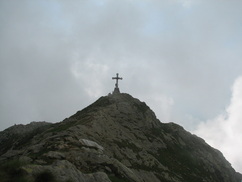 About four years ago I had the experience of climbing a mountain in northwestern Italy while on pilgrimage. I cannot say it was a complete joy, because it was not, at least not until we got to the top. It was one of the most arduous, scary things I have ever done. I hate heights. I must have been crazy to even consider it! On the other hand, it was not horrible either. It was scary, but it was also was one of the most eye-opening, moving experiences I have had in my life. As I said, I was on a pilgrimage. Pilgrimage is more than just a trip; it is a time of learning about oneself and God. And believe me, I learned a tremendous amount about both on that climb. The climb seemed like it would be no big deal when I was told about it. (That thought should have been a “red flag”!) I knew it would not be easy: I thought it would be more like a difficult uphill hike. I could not have been more off the mark. Mt. Mucrone was very rocky, with trails marked by little red paint marks here or there to give a hint that we were on the right track. It had few real paths and one or two snow/ice fields to negotiate. (It was July 4th!) There was a lot of pulling up with our hands, and we had to use all those “hidden” muscles in our arms and legs. Trust me, I found all those muscles when they ached for days afterwards! But the point of the climb was to get to the Cross on top of the mountain. It was where Blessed Pier Giorgio Frassati liked to pray from time to time. We were on a pilgrimage in his footsteps, so the climb was part of the experience. (Thank God he liked mountain climbing and not skydiving. I have my limits!) Most of us have "done" Lent before, so we can often approach it the way I approached my climb, like it is "no big deal." We know the drill: fasting and abstinence, prayer, and almsgiving. We think it will be a challenging hike, but once we start on the journey and it gets a little harder, it is easy to be tempted to give up because we underestimated the journey. Such as any climb, Lent requires commitment because our love of God is a commitment. It means we must more give time to prayer and good works. Sometimes prayer gets rocky and the path is not all that clear. Sometimes we have to work our muscles a bit. But if we are going to be transfigured with the Lord, such as we heard in this past Sunday's gospel, we have to go to the top of the mountain with Him. Moses did not find God at the base of the mountain, and the apostles did not witness the Transfiguration until they had climbed with Jesus to the top. There was no easy path and there was no tram to take them up. They had to make the arduous climb by hand and foot. I am sure at least one of those men was like me: a bit queasy when he looked back. But the only way to the glory was by making the climb. We have to look ahead, not back. In order to experience the glory of the Lord in our prayer we need to take that extra step in our faith life, such as going to the Sacrament of Reconciliation and facing our own sinfulness in order to let it go and be transfigured by God's grace. It is in the Sacrament that we are given the strength to avoid the sins we habitually fall into. It is not enough to want to be cleansed: we have to want to change, to desire to become stronger and holier. We do this every year because it is something we need to work on our entire lives. We grow gradually. I do not believe the apostles were ready to see the Transfiguration before they climbed that mountain. They had to work hard to make it to the top in order to go through the transformation they needed. Once they got there and experienced the glory of the Lord through and in Jesus, they no doubt understood better why they needed to climb in the first place. They were not the same going down as they were going up. 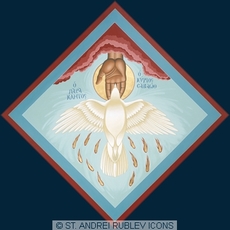 I thought I was really good at trusting until I was on that mountain. I realized I trusted a lot better on flat, solid ground than when I was clinging to rocky surfaces trying to go to the next level. At some point I began to see that I was trying to do it on my own power. Once I let God have more control and began to totally rely on Him, a funny thing happened: the climb got easier. The best part came at the top. Once there, the rest of the group went across a small land bridge to the Cross (in the top photo). I stayed back to take some pictures of them from the top, but it also gave me the alone time I so desired for prayer. It was during this time that I had what I have called my "Moses experience" because the cloud rolled in and I felt enveloped by the presence of the Lord. It was an experience of deep consolation which is very difficult to put into words. When our group was about to descend, I realized that I no longer feared being up so high (approx. 7,660 feet). Most people said the climb down was more difficult. Not me! I found it was much easier. I had transfigured with the Lord in a sense, and was so moved by the experience that I had a joyful climb down. I think this is why we hear about Moses going up the mountain and the Transfiguration of Jesus so early in Lent. It is important for us to realize that the Lenten journey can be very challenging. However, we do not make the journey alone. God knows the graces we need and also what we need to release as we climb. If we are really serious about this, we can expect some hard work. However, the rewards are so great that it is all worth it. I say, "if we are really serious" because I know how easy it is to cruise through Lent without really entering into it. The point of this season is to help us to be ready to meet Jesus when He comes, not just at the end of our life or in the Second Coming; it is to be ready when He comes every day in the "disguise" of the poor, the stranger, the lonely, the sick, the challenging, the inconvenient, the annoying, the emotionally needy, etc. He comes to us daily in our families, whether it is our spouse, sons, daughters, or an aging parent. He comes to us in our friends, neighbors, and co-workers. Often the climb feels uphill as we learn how to love in new ways and try not to let our love grow routine or lukewarm. That is the real challenge: to let our love grow ever new and ever deeper. It means we have to let go of old habits and old ways of thinking. It means we have to let Jesus lead us and that we have to truly trust Him by taking the risk of the climb. But believe me, the view from the top and the enveloping presence of the Lord is worth more than the discomfort of the journey: at the end we discover that having persevered leads us to joy. Let us rise to the challenge and take the next step on our journey, adding a bit more time for prayer in order to let the Lord reveal to us what keeps us from transfiguring with Him. We need to let Him guide us. Let us trust Him enough to lead us across what seems insurmountable in our lives. Let us let go of all that holds us back, especially fear. He will always keep His promise to be with us and He will never force us to the top. More than anything, He wants to share His glory and the heights of His love with us. May we let go of fear and continue to take another step each day of our Lenten journey! May we trust that even if we hesitate or stumble, Jesus will help us to get up and keep making the journey to our goal, which is a deeper relationship with God! May we have faith to trust in God, hope to not give up on the Lenten commitments we have made, and love to motivate us to get closer to the Lord who wants nothing more than to have the same intimate friendship with us that He had with Moses, Elijah, Peter, James, and John! May we continue to meet in the midst of the cloud where Jesus transfigures, so that we, too, may be transfigured by Love! Peace! The top photo was one of the pictures I took while on Mt. Mucrone. The cross was actually a little lower than where I was, on an outcropping across the land bridge. The image is The Holy Spirit, The Lord, the Giver of Life, the Paraclete, Sender of Peace by Rev. William Hart McNichols. At the Transfiguration the voice of the Father is heard and the Holy Spirit comes as the Shekinah, the protective presence of the Holy Spirit. If you are interested, you can find the image at http://www.standreirublevicons.com/gallery.php?action=viewPicture&id=189.  A number of years ago while on a plane which was beginning to taxi down the runway, I overheard a conversation between a little girl and an older relative. I was seated right in front of the little girl, who was traveling with her mother and the relative, on what was obviously her first flight. As we began to pick up speed the little girl got more and more excited about this first flight experience. When we became airborne and were hitting the first bank of low clouds, the little girl was pointing out things she was observing, in awe over seemingly everything. Suddenly she asked rather loudly, "Auntie, are we going to see Jesus today?" In less than a heartbeat her aunt shot back, "O dear Lord, I hope not!" The entire section of the plane in which I was sitting erupted in laughter for a couple of minutes because it was hilarious; it got us all inside the mind of a little girl who had obviously been taught at some point in her young religious formation that Jesus resides in the clouds. She took what she had been taught quite literally. One can see why she thought that we might see Him. What trust! The aunt's reply, while humorous given the scenario, is probably the response many of us might give to such a question, even on "terra firma." Most of us do not even want to think about the prospect of seeing Jesus today because the obvious implication is that we would have to die in order for this to happen. The aunt was not ready for the plane to crash or for all of us to literally see Jesus through the unintentionally suggested “impending doom” of the question. But the more important issue at hand here is readiness. Are we ready to see Jesus face to face? And if we say no, why not? Obviously none of us want to die because we see life as a gift. But we are in a time of year in which we should think about these things. Lent is about getting ready for eternity. Jesus already came, died and rose. We know that. The season of Lent is a time to remember that we need to be ready for Him to return and ultimately to spend eternity in Heaven with Him forever. As we ready ourselves for Easter, we are really preparing for the Second Coming of Christ. And in order to be ready, we also remember. We remember what Jesus did for us by becoming one of us, then going through the horrible ordeal of all manner of suffering, death on a cross, and resurrection in order to overcome the power of death and to open the gates of Heaven for us. Therefore it is all about Heaven and our desire to be there. Lent is an excellent time for us to make ourselves so ready that we do not have to have the response, "O dear Lord, I hope not!" when considering if today is the day when we will see Him face to face. This time is a good time to work on our readiness.  Recently the northeastern part of the US had a huge blizzard. Individually, the people of that area knew it was coming and they readied themselves with the requisite milk and bread, gas for the snow blowers, and whatever else they may have needed. As communities, the townships and cities readied themselves with salt, sand and plows that would be needed to clear streets. When the storm hit, it dumped several feet of snow in many areas. Despite their efforts there were some areas where they simply could not keep up. But in the end they were prepared enough to get through it together. It was a team effort. People helped one another. Lent is also a team effort. The Church invites us to work even more closely together than ever during this season. We are challenged to give prayer, fasting, and almsgiving more time and attention. We are encouraged to come to Mass more frequently if we can. We are invited to the Sacrament of Reconciliation in order to wipe away and atone for anything which stands between us and God. Prayer is always important, but during Lent we are reminded that we need to have a relationship with the Lord that is growing, not stagnant, just like in any other friendship. But we are also reminded that community is important. We are all in this together. Our prayer is not only about "me and Jesus", though we do need a personal relationship of intimacy with Him. It is also about the entire Body of Christ. We all are building the Kingdom and we all are intended to be together in Heaven for eternity. It is clear from reading the Old Testament that God came to save Israel as a nation; He did not save only Noah, Abraham, or Moses. He saved the entire family of Noah; He saved all of the descendants of Abraham; He saved all of Israel through the exodus experience, and so on. Therefore it is important for us to realize that our prayer is important to everyone; it is important to the entire community. Our works of charity, almsgiving, the Corporal Works of Mercy, simple acts of kindness, positive attitudes, etc. are all important to the entire Body of Christ. Our fasting and prayer may be private, but they affect the entire Body in a powerful, even if often unseen, way. Finally, these efforts have an impact on our own lives. If Jesus came for any one of us today, we should be ready. These acts help us to be ready. We should never fear death because it is the passage between this life and new, perfect life. It will bring us to everlasting life with the Lord. This is what He promised us. Most of us would not like that passage to come today, but we should live life in readiness for it because not only do we have no idea when the moment of that passage will be, but because people who live in readiness are holy people. Think about it: prayerfulness leads us to trust in the Lord, and it leads us to intimacy with Him. All authentic prayer always leads us outward to action. Those actions are works of charity and kindness, as listed earlier, because a loving heart cannot keep the love to him or herself: it overflows. Fasting is a real sacrifice because it awakens our minds and hearts not only to what it is like to be lacking enough food to eat, but to the suffering of those around us. People may hunger for more than just physical sustenance: they can be hungering for time, attention, decent clothes, companionship, work, knowledge, health, and for love. When we fast we open ourselves up to the reality of the hungers in ourselves and in others. Therefore it opens us up to deeper love. Let us ready ourselves this Lent. Let us open ourselves to the call of the Lord by adding more prayer, fasting and abstinence, and almsgiving to our regimen. Let us realize that we do see Jesus every day, maybe not in the clouds, but in the people around us, be they friends, co-workers, family, or strangers. Let us pray for the world and its leaders, and for the Church, especially for Pope Benedict and those entrusted with electing a new pope. Let us pray for our families, as well as the sick, the poor, and the lonely. And then let us go out and do something to share the love we have been given. May this Lent be a time of renewed prayer and reflection! May this time be ripe with spiritual fruits and the renewal or deepening of our relationship with Jesus! May it be a time of cleansing and renunciation of our sinfulness, and a time to receive healing and forgiveness through the sacraments! May our eyes be opened to seeing Jesus all around us, so that in answer to the question as to whether we are ready to see Jesus today, the answer is a resounding "Yes!" Let us continue to meet in the Heart of the Lord, where all are welcome and all are loved. Peace! The photos are both mine. The first one was taken in New Mexico, near Taos. The second one was taken many years ago at the Cenacle Retreat House in Lake Ronkonkoma, NY. I used to go back in the wooded area to pray. The object at the end of the path is a little shrine to St. Thérèse Couderc, foundress of the Religious of the Cenacle. 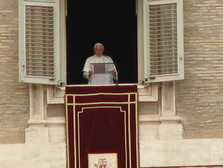 By now everyone knows that Pope Benedict XVI is stepping down from his position as pope at the end of the month. It has been on all the news media and many were stunned by the announcement. Since then there has been some discussion about what prompted Pope Benedict's decision and there have been many prognostications made as to who might be the next pope. In addition, there is a lot of commentary about what he will do for the rest of his life. But what many forget in all this conversation is that the Pope is really not who is in charge of our church. God is. The Holy Spirit, specifically. It has been that way from the beginning of the Church at that first Pentecost and it will always be that way. Therefore we remain in good hands. When I taught, I would ask a somewhat trick question on one of my quizzes. (I rarely put trick questions on my tests, though I am sure my former students would argue that!) The question was point blank: "Who guides the Church?" Invariably about half of them would respond that it was the pope and I would mark it wrong. If I had said, "Who oversees the Church on earth?" then those who answered that it was the pope would have been correct. But the point was to remind them that the Church is ultimately guided by the Holy Spirit. My question may seem like a technicality, but the reality is that the Pope is the Vicar of Christ, Christ's representative on earth. The role of the Holy Spirit is to guide the Church, particularly the Magisterium. The Magisterium is the body of bishops whose role it is to oversee the Church, led by the Pope who is head bishop as bishop of Rome. The pope is under the influence and guidance of the Holy Spirit, as is the entire Church. Pope Benedict is as aware as any other bishop that his role is to be open to the Holy Spirit and to constantly be discerning what the Spirit is calling for in His Church. The Church is holy, but not perfect; it is led by the Spirit who is God and therefore perfect, and it is populated by humans who are flawed and imperfect. Regardless of what one thinks of this particular pope's performance, he is the pope who the Spirit guided into office and the Spirit is guiding him out of office. I cannot imagine the amount of prayer and anguish that Pope Benedict went through to come to this decision. It is anguishing to say yes to this job in the first place. When a pope is elected the Camerlengo (Chamberlain) approaches the man who has been chosen and says, “Do you accept your canonical election as Supreme Pontiff?" The pope-to-be responds: "Accepto." That is, "I accept." The minute he says that, he is pope! He then is asked what name he wants to be called and he responds with his chosen papal name, such as Pius, John, Benedict, etc. Following that he is whisked away to another room to get dressed into the white papal cassock and his formal papal vestments for the announcement ceremony. (The outside world still has no clue who is the new pope. They have seen white smoke and are waiting with great excitement.) Here is my point: the room he goes into to change his clothes is called the Room of Tears. It is called that for a reason. Usually the new pope is so overcome at what has just happened that he weeps. He is not necessarily weeping for joy. Usually he is overwhelmed at the fact that he is now carrying the entire church on his shoulders. It has to be a lonely job. This is why I say Pope Benedict must have had anguish going into the job. He was 79 years of age and he wanted to retire when he went into the conclave. He came out of the conclave as pope. Now after almost 8 years, he is even more tired. Benedict is a brilliant man: he has to know that this will have a great effect upon the Church. I do not believe for a second that he was not praying over this for a long time, and that it was at a great cost of tears and anguish that he came to this conclusion. But I do think he did the heroic thing in stepping down if he felt he could no longer handle the rigors of such a position. 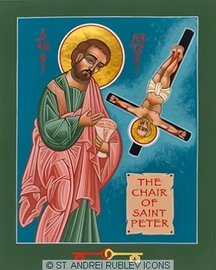 Today is the day we celebrate St. Valentine’s Day, but it is really the feast day of St. Cyril and St. Methodius. Cyril and Methodius were brothers who evangelized Hungary and what is now the Czech Republic. They translated the scriptures into Slavonic and invented a language in order to do it, (Cyrillic). They met with much hostility even from the church itself which misunderstood what they were doing. But because of heroic love they continued to spread the Good News. St. Valentine was said to have been arrested and martyred because he was marrying Christian couples in the third century when Christianity was illegal. His love was heroic in that he died for love in a twofold way: first, by upholding the sacramental power of love in marriage, and second, he died out of love for Jesus Christ, whom he refused to renounce when brought before the authorities. Therefore, this day is a day when we should reflect on the nature of love. It is wonderful to remember in a special way those with whom we are in a romantic relationship. It is wonderful to remember our friends and family, those whom we care deeply about, by reminding them of our love today. But we should also remember the love that is given us by those who have gone before us in the name of love and those who are our leaders in the faith. Many saints wrote prolifically about love. I am also thinking of St. Thérèse and her Little Way. That was heroic love. I am thinking of St. John Vianney who loved his flock dearly and shared his love of God with them through his wonderful sermons. I am thinking of St. Pio, (Padre Pio) who was willing to suffer greatly for those who he loved so much, his spiritual children, as well as the many strangers he assisted spiritually. Mostly I am thinking of our Lord Jesus who said that no greater love exists then to lay down one's life for a friend. I think Pope Benedict has laid down his life by being willing to serve, and I think he will continue to lay it down as he spends the rest of his days in prayer. He will no doubt be spending much of that time in prayer for the Church he loves and has served. Let us keep Benedict, who will return to his birth name, Joseph Ratzinger, in our prayers. He will need them. Let us learn by his example that sometimes doing the difficult thing is the right thing. Let us learn to have compassion for those who lead us: regardless if we agree with their actions or stances, or not, they do sacrifice much to work so tirelessly, such as Pope Benedict has done. Let us pray for the Cardinals who will be convening soon to elect the next pope. They, too, will have a difficult job. And finally let us remember who is really in charge: the Holy Spirit. Maybe we should all pray to the Holy Spirit each day, asking Him to guide our Church and our Church leaders. That would be our response of heroic love. May we all turn to the Holy Spirit for guidance in our daily lives! May we trust that the Holy Spirit will guide our Church! May we turn to the Spirit of Love for an increase of love in our own hearts and actions! May we be open to the lessons God offers us in this Lenten season! Let us continue to meet in the Heart of the Lord who is Love. Peace! The top photo is one I took in 2009 while in Rome on pilgrimage. Pope Benedict was giving his weekly blessing of all those gathered in the Square. The icon is The Chair of St. Peter by Rev. William Hart McNichols. It can be found at http://www.standreirublevicons.com/gallery.php?action=viewPicture&id=396 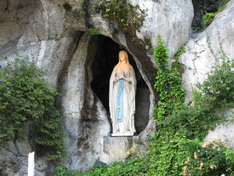 While doing my errands the other day I ended up in line at a local store with my cart full of items. In front of me was a man who had one item to purchase. When he was being checked out the clerk said, "That comes to $5.07." The man had a five dollar bill in his hand, and began fishing in his pocket for change. He pulled out a twenty, but obviously had no change. Since I already had my wallet in my hand, I dug out seven cents and handed it to the cashier saying as I did so, "Take this. There is no sense breaking a twenty for a few cents. What's seven cents between friends, anyway?" The man was so stunned that he barely knew what to say. He was not a poor man; it was just that I saw that he had no change and there was really no point in the clerk breaking a twenty for seven cents! It was simply a gesture of friendliness on my part. However, the man was apparently bewildered that a total stranger would do this, though he did manage a small smile as he left. It was not a big deal. It was only seven cents and it was not an act of charity in terms of whether or not he could afford it. But it was an act of charity insofar as it was intended as a small act of love, (caritas). It affected everyone who was aware of it. The lady in line behind me smiled. The cashier and I ended up having a small conversation about it, and when I left we were both smiling, too. It obviously made her day, and hopefully the man's day, as well. And it made me feel good because I did something really small, but it changed the rest of my day in ways I had not anticipated. I ended up realizing that it does not take much to live lovingly. There was nothing heroic in what I did. It was simply a small act of kindness directed at the man and at the cashier. February 11 is the feast of Our Lady of Lourdes. This is the title given to the Blessed Virgin Mary when she appeared to St. Bernadette Soubirous at the grotto of Massabielle in 1858. Mary eventually identified herself as the Immaculate Conception, but we also refer to her as Our Lady of Lourdes since this is where her appearances and her messages took place. Though we associate Lourdes with physical and spiritual healing, Our Lady called for repentance and charity, especially given to the sick and the poor. We often associate works of charity as "the big stuff" such as donations of money, or goods or really big gestures of kindness. While that is true and we should do those things, it is important to have an attitude of charity, such that we realize even the smallest of gestures can be important. I am sure that Our Lady intended us to cultivate such an attitude. If one can do the big things it is usually because one has learned how to do the small, almost unnoticed things. It really does not take much to have a charitable attitude. I wish I could claim to have that kind of attitude in every encounter, but certainly it was nicer to have that attitude at the moment in the store, then to be impatient about who was in front of me in line when I wanted to get on my way. I attribute that to grace. And surely the one action of something small like that, leads us to do it again and again, which is what opening our hearts to grace does. It seems that when we intentionally try to be disciples and we pray for the grace to do it, the Holy Spirit does give us what we need. Any time we pray we are opening up the door to grace, which then comes to us all day long. The prayer helps us to know what to ask for and then to know what it is we are looking for when an opportunity presents itself. Prayer cultivates an attitude of being a disciple and hence an attitude of love. 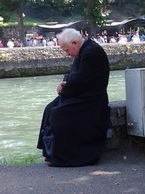 To be a disciple means to put God first in all things and it means to be one who loves just as Jesus is one who loves. In the Gospels we hear Jesus speak of love as agapè; that is, He teaches us to love those who are hardest to love. That is the same love God has for us. He loves us no matter what we do and it is heroic when we imitate this. Loving those who have hurt us is probably the most challenging form of love, but I believe that loving the strangers around us can also be challenging. This is mostly because they are people we may never see again and so we can develop an attitude of not really caring how we behave since they are not part of our day to day lives. On the contrary, the stranger is part of our day to day, even if we only meet once in this life. This is why it is heroic to develop an attitude of charity. We do affect one another, often more deeply than we will ever know. We know how little acts affect us, so we need to keep in mind how our actions affect others. An attitude of charity is related to putting God first in our lives. If God is first, then we are attempting to love Him in all others. We need to lose our self-centeredness and practice other-centeredness. In other words, being a loving person means being humble. I know who I am; I am not greater or more important than others. Who I am is a disciple. I am here to serve and to put God first by loving Him in others. Small acts of love are important because they are little and almost unnoticeable. These acts help others and cost us little. But when they add up, they do become heroic insofar as we develop the attitude of love that Christians should be known for. At the end of Matthew's gospel (Matthew 25) Jesus tells a sort of parable about the sheep and the goats. The sheep are the ones at His right side who will be in Heaven because they did acts of love, such as visiting the sick or giving food, drink, or clothes to the poor. They are the ones who did little acts that were loving and which led to the bigger actions. The goats on the left are the ones who never developed that attitude of charity. It seems that what Jesus is teaching is that at the end of our lives we will be judged on the quality of our love. That does not mean just the big stuff, but the attitude we had about everything we did in our lives. Heroic love is not just the love that saves people by giving all our money to the poor or other similar "huge" gestures: it is about having an attitude of love towards everyone we meet, especially the stranger. Let us heed the message of Our Lady of Lourdes and be charitable in everything we do. Let us ask the Holy Spirit for the graces we need to develop such an attitude. All it takes are a few small gestures to make it habitual. As we enter Lent we are more conscious of growing as disciples; let us create the fertile ground for growing in the heroic love in doing the small things by prayer, fasting and abstinence, alms-giving and repentance. May we grow in discipleship, asking for the graces to be more loving in the day to day events of our lives! May we spend the time in prayer cultivating our hearts as fertile ground for the Spirit to offer graces for charitable living! May we let God’s grace move us to change our attitudes and do more of those little acts of love! May we continue allowing His Heart to speak to our heart! Let us ask the Lord to make our heart His home. Let us meet in the Lord, as always. Peace! (The two photos are from Lourdes, France which I took while on pilgrimage there in the summer of 2012.) 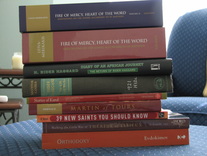 I used to say that when I get to my mansion in Heaven it will be filled with every musical instrument there is and I will spend my Heaven glorifying God with music. I think I am going to revise my "intention" for my time in eternity, however. Now I want my mansion to have a library so that between songs I can read all the books that I have wanted to get to at some point...because it will take eternity to get through them all! (Oh, and to be clear, I want to take a page out of St. Thérèse's book and help people on earth, too...maybe I can help them know what to read!) Too many books, so little time! What's a person to do? I have all these books piling up, and I cannot keep up with them all! I am a very fast reader, but with spiritual books I do not read quite as fast since I end up reflecting or praying with a lot of what I read. I admit that I while I do not have any vices I can think of, I am a “readophile”! (I just created a new term. I know a “bibliophile” is one who loves books, but the definition is of one who simply loves books for the sake of books. I love to read them, hence my new word.) I have been this way since I was a child, and I think I may have been born this way. (No intentional reference to Lady Gaga!) My mother would call me for dinner multiple times and I literally would not hear her because I was far away in my world of books. After she figured out what was going on, she stopped being annoyed with my lack of response, thank goodness. When I was growing up, my favorite free time activity was to ride my bicycle to the local public library and sit all day in the stacks reading books. I would polish off a few and then take a stack home, only to need to go back a few days later to refresh the stack. I did not just read novels. I spent a lot of time in the 200's.... For the non-librarians in the crowd, that is the theological/spiritual section of the Dewey decimal system I grew up with. I would sit down on the floor, on the upper level of the library where the 200 section was located, and read all day. Oh my goodness, I would say I am a terminal case! Today, I am aided and abetted in this love of books by a couple of friends who are constantly helping me to know what to read. They know me well and so they are rarely wrong in their suggestions to me. But just today a friend made an important observation: when I do get to eternity, will I have wanted to have spent time with this or that book? In other words, while there are a lot of good books out there, (and I do love to read novels, especially detective novels, I confess), it is important to be discerning about what we are spending our time with. I have no intention of taking on the role of book critic. But my friend's question bears some reflection. He asked: "How big, deep, tall should a pending-reading-book-pile be?" I do not know the answer to that question, but I do think that it is important to call a moratorium on buying occasionally and actually start reading some of them. And it is a good idea to be discerning as to what we buy in the first place. But I do think each of us should do spiritual reading, (as well as entertainment reading). Spiritual reading is important because it often helps us to understand something about God or about discipleship better. It can also lead us to prayer. I never read a spiritual book without a notepad nearby, because often I want to spend time with a thought or idea that has moved me to prayer. It is important to pray first, and write later, so as not to lose the conversation with God. We do not want to be short-circuiting the gentle invitation to prayer by stopping to write. The inspiration to pray is from the Holy Spirit who is moving us to spend time with an insight. That is a grace. The best spiritual reading is the Bible. The Scriptures are God's message to us; it is God’s Word. If you are unsure of what something means, maybe taking a course on Scripture can be helpful. The Bible is a book we really should know inside and out. If you cannot take a course, then start with the gospels and get a deeper sense of who Jesus is. He reveals to us who the Father and the Spirit are. Read a chapter of a gospel each day and spend time truly getting to know Jesus. If we call ourselves disciples, we really are falling short if we do not know the Master. Lent is coming very soon. Maybe an idea for a Lenten practice is to give up a bit of time spent at the computer with social networking or games or whatever it is that eats up a lot of your time. Or maybe it might be to give up some TV time. In its place, read something spiritual. It can be the Bible or the life of a saint, or a book about prayer. I am not against novels; I love them especially because there are many good works of literature with Christian themes, such as the works of J.R.R. Tolkien or C.S. Lewis. And there are many excellent novels that are not religious but have thought provoking situations or ideas. But it is important to spend time with the Lord through the gift of books. On the other hand if we spend too much time with our nose in a book and not enough time with the people around us, doing service or having conversation with family and friends, then it becomes a substitute for real interaction. The key is to take what we read and put it into action. Doing too much of anything is not a good thing. What we need most of all is a sense of balance. All authentic prayer always, (always!) leads us outward. That is, if we are really taking in the message of our spiritual reading and what we are praying about as a result, it will lead us outward in love and service of others. If not, either we did not truly let the message take root in us, or we are out of balance in how we apportion our time. Reading is good, becoming a recluse is not. Prayer is really good, but unless you are called to be a hermit, using it as an excuse to do nothing is not at all what God would want, (and by the way, hermits do not “do nothing”!) We can pray by our actions. That is, what we read and learn through our prayer should move us to love, and love moves us to service. When we love others, that is prayer! It is prayer in action. And when we act, we meet God in those we are with. Let us ask the Lord to help us with the balance of reading, recreation, and prayer. May we be moved by the Holy Spirit to know when it is time to read and when it is time to act! May our prayer help us to discern what the Lord is calling us to do with our time and talent! May we be inspired by what we read in order to know, serve, and love our Lord better, that we may become truer in our discipleship! Let us meet in the heart of the Lord, where all true wisdom and love resides. Peace. P.S. I have added a page to my website which lists recommended reading. It can be found as a tab called Michele's Book Corner or you can click here. These are books which I have enjoyed or think are good books, therefore the list is subjective. Please be patient while I spend time getting it together. Oh, I have to run; the UPS man is at the door with a new delivery of books.... (Just kidding!) 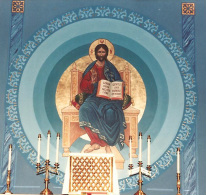 A few years ago one of my students wrote in a paper that his mother taught him that every day when he got home from school his best friend would be waiting for him. As a result he looked forward to getting home so that he could spend some time with this best friend. To think of leaving school after a long and often grueling day to spend time with a friend (without even mentioning the homework that had to be done), is the absolute best thing any young person could imagine. While I thought that his mother was referring to herself, in fact, she was not: "the best friend" to whom she was referring was God. My student would go home after school, go to his room, and spend some time in prayer. He did this not because he had to, but because His best friend was waiting for him to share his day. You can imagine that reading this deeply affected me. There is nothing like having a good friend waiting for us. During those times in our lives when we are feeling alone or like nothing is going right, just knowing there is someone there who can make us laugh, or who can listen well, can make all the difference. We all know at least one person in our life that we could turn to when we are feeling this way. Even on a "garden variety" day, to know we can leave the grind of work and go hang out with a friend is enough to make any work lighter. It is a blessing to have such a friend with whom we can mutually share our deepest thoughts, our biggest sorrows, our funniest stories, and the ordinary "stuff" of life. Today people frequently refer to what seems to be that one special friend with the acronym BFF. That’s Best Friend Forever, for the uninitiated. We may see or hear that term bandied about somewhat loosely. Today “so and so” is my BFF and tomorrow someone different is my new BFF. It seems that friendship is a fickle thing. Even the term friend has taken on a new meaning. On social networking sites “friend” refers to someone with whom I have a connection on said site. It does not necessarily mean someone with whom I have built a close relationship or whom I have known for a great many years. The meaning seems to be more like what I grew up understanding an acquaintance to be, which is simply someone I know or have met somewhere along the line. Yet here are all these people with hundreds or even thousands of “friends.” I guess it could be worse: at least they are not enemies! Can all these people really be our intimates? Can they all be so interested in our welfare that they would lay down their daily lives at a moment’s notice to be with us if we needed them, or we for them? In all likelihood the odds are not too high for many of them. A few of them, oh yes…without a doubt. And with these few our lives are truly blessed! Don’t get me wrong: I have nothing against being in touch with acquaintances along with true friends. In fact they are all blessings to me and I am grateful for each of them. But I do not have any allusions that they are all intimates with me. I simply want to be clear that being a true friend, especially a best friend, means the willingness to go a lot further than you would go for anyone else to support them. They are a constant in our lives. It means we trust them with our deepest confidences and know the trust is mutual. We love them like a brother or sister. We simply cannot have that level of friendship with everyone. We can have lots of friends, but only one or two who we would call best friends. The beautiful reality is that while we do have true and dear friends, we also have Jesus, our friend of friends. He is our true BFF who is not at all fickle or fair-weathered. He truly sticks with us through thick and thin, from the moment of our conception until we draw our last breath, and then some….as we enter fully into His presence in Heaven forever. Jesus is our best friend insofar as there is no one who could possibly love us more than He does. He is, after all, God. 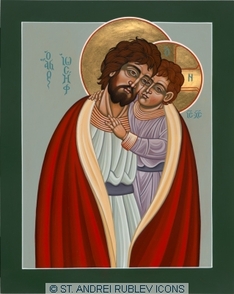 We know that Jesus is true God and true Man. In all the time He was on this earth He shared who He was with His friends. It was not all preaching to the crowds or arguing with Pharisees. He shared in the lives of many, just as we do, on a daily basis. That the Son of God came from Heaven in order to be one of us is so incredible in its scope and reality that it is beyond our capability to understand. Maybe that is part of my point: that the Son of God would come down and befriend us in an entirely new way, an unimaginable way, as to become one of us, is an amazing testimony to God's desire for intimacy with us. He wants to be our friend. He came to begin His kingdom here and He has asked (us) His disciples, and yes, friends, to help Him with the work of bringing it to fulfillment. While Jesus performed many acts of power (miracles) in Mark's Gospel the author records that just about every time He did something spectacular or miraculous, He asked the observers or recipients to keep it secret. This request is referred to as the Messianic Secret. It was impossible for people to do as He asked. So why would Jesus ask such a thing? It seems to me that Jesus did that because He wanted people to follow Him not just for what He could give them, but for His message. That is, He wanted them to love Him for who He was, not for what they could get from Him. It is not that He did not want to give us things. He did give all: He gave His life to save us and He gave His Holy Spirit to guide us forever. There is nothing greater anyone could ever give. But He wanted our friendship, not to be glorified on earth during His lifetime. In all the accounts of His life, He spent numerous days with people in their homes and on the streets, but only revealed His divinity once (when He was transfigured). Therefore it seems to me that it was very important to Him that people know that ultimately what God wants most is our love and friendship. There is no greater friend we can have than Jesus. While we have many dear and faithful friends throughout life, there is none more faithful than Jesus, Our Lord. He never abandons us when we are alone, in trouble, sick, or dying. He laughs at our jokes and He weeps when we weep. He hears our requests. He knows our deepest longings. But there is so much more! He is our friend forever. This is a relationship that begins when we are baptized and it goes on forever. No matter what we do, or fail to do, He does not change his status where we are concerned. He will never un-friend us or “unlike” us. From the moment God thought of us and desired to bring us into the world, He loved us. He loved us into existence, so there is no way that He would ever change His mind. This friendship lasts for all eternity. He is the Alpha and Omega and never changes, therefore His love for us will never diminish or change. We can rely on Him and know He will never fail us. Let us learn how to be a friend following the example of Jesus. May we be dedicated to serve those around us treating them as friends would want to be treated! May we be willing to open our hearts to people who may be in need of a friend! May we be true in our love and devotion to those the Lord has put in our lives! May we have the desire to let Jesus be our best friend to whom we run each day! Let us meet in the heart of the One who is our true best Friend forever! Peace! The top photo is an icon in a Byzantine rite church that I visited many years ago in Pennsylvania. The icon is St. Joseph and the Holy Child by Rev. William Hart McNichols. I chose this because no doubt Jesus learned much about how to be a man from his earthly father. You can find this icon at http://www.standreirublevicons.co/gallery.php?action=viewPicture&id=387 |
Heart Speaks to Heart
|

 RSS Feed
RSS Feed

